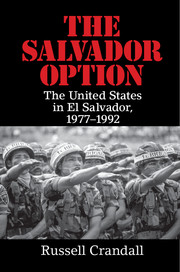Book contents
- Frontmatter
- Dedication
- Epigraph
- Contents
- List of Figures
- List of Organizations
- Acknowledgments
- 1 Introduction
- PART ONE EL SALVADOR IN THE COLD WAR
- PART TWO JIMMY CARTER
- 7 Revolution and Counterinsurgency in Guatemala
- 8 Mass Organizations
- 9 Carter Arrives
- 10 Carter and the Sandinista Revolution in Nicaragua, 1979
- 11 An October Coup
- 12 Carter Engages Salvador
- 13 Archbishop Romero
- 14 Land
- 15 The American Churchwomen
- 16 Arming the Rebels
- 17 Guerrilla Final Offensive, January 1981
- 18 Death Squads
- PART THREE RONALD REAGAN
- PART FOUR GEORGE H. W. BUSH
- PART FIVE POSTWAR
- Notes
- Bibliography
- Index
9 - Carter Arrives
from PART TWO - JIMMY CARTER
Published online by Cambridge University Press: 05 June 2016
- Frontmatter
- Dedication
- Epigraph
- Contents
- List of Figures
- List of Organizations
- Acknowledgments
- 1 Introduction
- PART ONE EL SALVADOR IN THE COLD WAR
- PART TWO JIMMY CARTER
- 7 Revolution and Counterinsurgency in Guatemala
- 8 Mass Organizations
- 9 Carter Arrives
- 10 Carter and the Sandinista Revolution in Nicaragua, 1979
- 11 An October Coup
- 12 Carter Engages Salvador
- 13 Archbishop Romero
- 14 Land
- 15 The American Churchwomen
- 16 Arming the Rebels
- 17 Guerrilla Final Offensive, January 1981
- 18 Death Squads
- PART THREE RONALD REAGAN
- PART FOUR GEORGE H. W. BUSH
- PART FIVE POSTWAR
- Notes
- Bibliography
- Index
Summary
Can a Nicaraguan-type crisis happen again? And, if so, what are we doing now to prevent similar crises? The simple answer is that it can happen again, and is likely to in El Salvador, Honduras, and Guatemala. The conditions that gave rise to the crisis in Nicaragua exist in these countries, only in a more advanced state. In a few years, if we don't address the underlying problems in Central America, the Nicaraguan crisis of 1978 will seem easy in comparison.
– Robert Pastor, White House aide, writing to National Security Advisor Zbigniew Brzezinski, October 23, 1978The advancement of human rights is more than an ideal. It, too, is an interest. Peaceful gains for freedom are also steps toward stability abroad, and greater security for America.
– Cyrus Vance, Secretary of State, March 27, 1980He may be an S.O.B., but he's our S.O.B.
– President Franklin Roosevelt describing dictator Rafael Trujillo of the Dominican RepublicThe painful debacle in Vietnam that officially ended in 1975 led many Americans to conclude that the United States should avoid fighting in far away jungles and swamps alongside dubious local allies in the name of defeating global communism. Growing inflation sparked by Vietnam War spending and the first “oil shock” in 1973, and the searing Watergate domestic political scandal that brought down Richard Nixon's presidency were two of many other factors that weakened the American public's confidence in their government's competence and honesty. Most notably in the 1975 hearings chaired by Democratic senator Frank Church, congressional revelations about the CIA's involvement in seemingly morally dubious covert operations that unseated sitting governments in countries from Iran (1953) to Chile (1973) only further weakened Americans’ self-given identity as a beacon of freedom and transparency.
The United States endured a period of “imperial presidency” following World War II when anti-communism fears inclined Congress to defer to presidential prerogatives in places like Vietnam. Now, by contrast, it was as if an imperial Congress sought to use its powers to check the Executive Branch. One way Congress attempted to redress these excesses was to focus on the internal nature of regimes receiving American aid, especially military.
- Type
- Chapter
- Information
- The Salvador OptionThe United States in El Salvador, 1977–1992, pp. 102 - 113Publisher: Cambridge University PressPrint publication year: 2016

